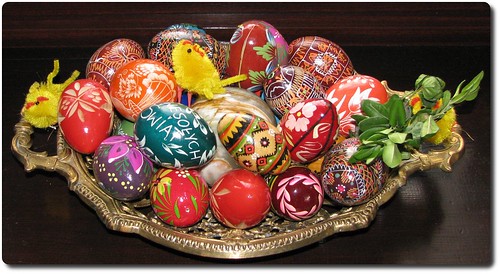Polish Religious Easter traditions Posted by Kasia on Apr 16, 2014 in Uncategorized
One of the most significant Catholic traditions in Poland is Wielkanoc or Święta Wielkanocne (Easter) that commemorates Zmartwychwstanie Jezusa Chrystusa (Jesus Christ Resurrection).
First, on the last Thursday before Wielki Post (Lent) there is the so-called Tłusty Czwartek (Fat Thursday) when all the people eat pączki wypełnione marmoladą (donuts filled with marmalade) or faworki or chrust (sweet crispy biscuits in the shape of thin folded ribbons, deep-fried and with powdered sugar). Then, we have forty days of Wielki Post (Lent) which starts with Środa Popielcowa or Popielec (Ash Wednesday). It finishes the period of karnawał (carnival). During this time every Friday there is Droga Krzyżowa (Stations of the Cross) in churches – a service which depicts Jesus road to be ukrzyżowany (crucified) and every Sunday – Gorzkie Żale (Opening Lamentations) – it is a collection of songs about Męka Chrystusa (Christ’s Passion).
On the fifth Sunday of the Lent there is Niedziela Palmowa when we bring gałązki palmowe or palmy (palms) to church to be poświęcone (blessed). There is a special konkurs (competiotion) known in the whole Poland which takes place in the village called Lipnica Murowana – its main idea is to make the highest and the most beautiful palm.
Then, there are Wielki Czwartek (Holy Thursday), Wielki Piątek (Good Friday) and Wielka Sobota (Holy Saturday) when there are special services in churches. On Wielka Sobota (Holy Saturday) we put different kinds of food into koszyki (baskets): jajka (eggs), sól (salt), chleb (bread), kiełbasa (sausage), chrzan (horseradish) and we take them to church where they are poświęcone (blessed) and eaten for uroczyste śniadanie wielkanocne (solemn Easter breakfast) on Niedziela Wielkanocna, Wielka Niedziela or Niedziela Zmartwychwstania Pańskiego (Easter Sunday).
The most important day of Easter is mentioned above Niedziela Wielkanocna, Wielka Niedziela or Niedziela Zmartwychwstania Pańskiego (Easter Sunday) with solemn masses. It is the day to be spent with families and relatives, to relax and rest. For children, there is the custom that zajączek wielkanocny (Easter bunny) brings presents. Sometimes, parents hide the gifts in different parts of the house, room or garden and children must look for them.
Poniedziałek Wielkanocny (Easter Monday) has a tradition called Śmingus-Dyngus (Dyngus Day) that is why it is also known as Lany Poniedziałek (Wet Monday)– people make others wet by pouring water or perfumes. It is especially popular with children and teenagers.
Similarly to Boże Narodzenie (Christmas), there are also various decorations bought, made and prepared for Easter. These are: baranki and zajączki cukrowe (sugar Easter lambs and bunnies), kury (chickens) and pisanki (colourful Easter eggs) – ręcznie malowane (hand painted), farbowane (dyed) or the so-called wydmuszki (blown eggs).
As you see, Polish festivals are rich in numerous traditions – both religious and these more earthly ones. This is very pleasant and weeks earlier all the people just feel the special atmosphere of oncoming unusual time. Polish people prepare for these Holy Days carefully cleaning and tidying the flats and houses, going shopping to buy presents for their relatives and thinking also about the spiritual side of the festivals.
Do następnego razu… (Till next time…)

Build vocabulary, practice pronunciation, and more with Transparent Language Online. Available anytime, anywhere, on any device.
About the Author: Kasia
My name is Kasia Scontsas. I grew near Lublin, Poland and moved to Warsaw to study International Business. I have passion for languages: any languages! Currently I live in New Hampshire. I enjoy skiing, kayaking, biking and paddle boarding. My husband speaks a little Polish, but our daughters are fluent in it! I wanted to make sure that they can communicate with their Polish relatives in our native language. Teaching them Polish since they were born was the best thing I could have given them! I have been writing about learning Polish language and culture for Transparent Language’s Polish Blog since 2010.





Comments:
Madzia:
I would like to recommend to anyone this blog, due to mountain of lies about current pope Francis: http://franciszekfalszywyprorok.wordpress.com/